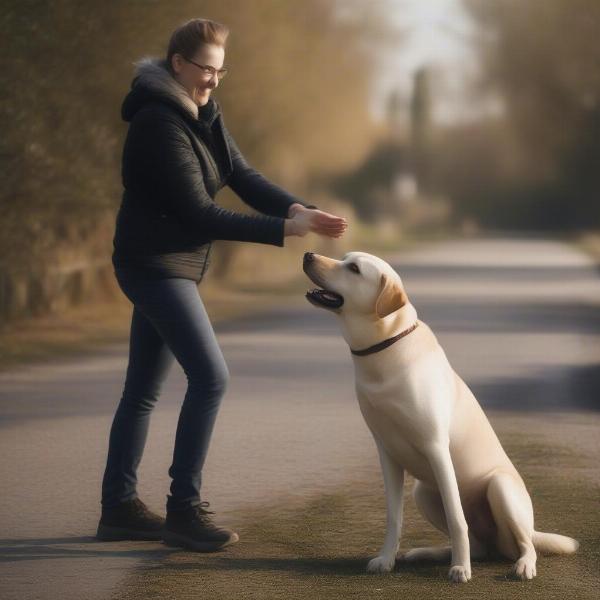Labrador Retrievers are renowned for their friendly nature, intelligence, and trainability, making them a popular choice for families worldwide. If you’re looking for a Labrador stud dog, it’s essential to approach the process with careful consideration to ensure the health and well-being of both the sire and dam, and to contribute to the responsible breeding of these beloved dogs. Selecting the right stud involves more than just finding a handsome dog; it requires careful evaluation of temperament, health clearances, and pedigree.
Key Considerations When Choosing a Labrador Stud Dog
Choosing a Labrador stud dog is a significant decision that requires careful research and planning. Consider these crucial factors:
- Temperament: A stud dog’s temperament is crucial, as it can significantly influence the puppies’ personalities. Look for a dog with a calm, friendly, and stable temperament. Observe how the dog interacts with people and other dogs.
- Health Clearances: Responsible breeders prioritize health testing. Ensure the stud dog has undergone relevant health screenings, such as hip and elbow evaluations, eye exams, and genetic testing for breed-specific conditions like Exercise Induced Collapse (EIC) and Centronuclear Myopathy (CNM).
- Pedigree and Conformation: A well-documented pedigree provides valuable insights into the dog’s lineage and potential genetic predispositions. While conformation (physical appearance according to breed standards) is important for show breeders, it’s essential for all breeders to ensure the dog is structurally sound and free from any physical defects that could be passed on to offspring.
Understanding the Importance of Health Testing
Health testing is paramount in responsible breeding. It helps minimize the risk of passing on hereditary health problems to the puppies. Discuss the specific health tests performed on the stud dog with the owner and request copies of the results.
- Hip and Elbow Dysplasia: These are common joint conditions that can cause pain and mobility issues.
- Eye Diseases: Progressive Retinal Atrophy (PRA) and cataracts are examples of eye diseases that can affect Labradors.
- Genetic Testing: Advances in genetic testing allow breeders to screen for specific genetic mutations associated with various health conditions.
Evaluating Temperament and Trainability
A Labrador’s temperament is a defining characteristic of the breed. When selecting a stud dog, observe its behavior in various situations.
- Socialization: A well-socialized dog is comfortable around people of all ages, other dogs, and different environments.
- Trainability: Labradors are known for their intelligence and eagerness to please, making them highly trainable. Inquire about the stud dog’s training history and any titles or achievements.
The Role of Pedigree and Conformation
While a champion bloodline doesn’t guarantee a perfect temperament or health, a well-researched pedigree can provide valuable information about the dog’s ancestors and their characteristics.
- Conformation: Conformation refers to the dog’s physical structure and how well it aligns with the breed standard. While essential for show dogs, conformation is also important for working and companion dogs to ensure they are physically sound.
Questions to Ask the Stud Dog Owner
Before making a final decision, prepare a list of questions to ask the stud dog owner. This will help you gather all the necessary information and ensure you’re making an informed choice.
- What health tests have been performed?
- Can I see copies of the health certificates?
- What is the dog’s temperament like?
- What is the dog’s training history?
- What are the stud fees and contract terms?
 Labrador stud dog interacting with its owner
Labrador stud dog interacting with its owner
Conclusion
Finding the right Labrador stud dog requires careful consideration of temperament, health, pedigree, and conformation. Responsible breeding practices prioritize the well-being of the dogs and contribute to the preservation of the breed’s positive traits. By taking the time to research and ask the right questions, you can make an informed decision that benefits both your dam and the future generation of Labrador puppies.
FAQ
- What is the average stud fee for a Labrador Retriever? Stud fees can vary depending on the dog’s pedigree, health clearances, and location.
- What is a stud dog contract? A stud dog contract outlines the terms and conditions of the breeding agreement between the owners of the stud dog and the dam.
- How do I find reputable Labrador breeders? Reputable breeders prioritize health testing and responsible breeding practices. You can find them through breed clubs, online directories, and referrals.
- What is the ideal age for a Labrador stud dog? Labradors should be mature, typically over two years old, and have all necessary health clearances before being used for breeding.
- What are some common health problems in Labrador Retrievers? Hip and elbow dysplasia, eye diseases, and certain genetic conditions are potential health concerns in Labradors.
- How important is socialization for a stud dog? Socialization is crucial for a well-adjusted temperament. A well-socialized stud dog will be more likely to produce puppies with stable temperaments.
- What should I look for in a Labrador stud dog’s pedigree? A well-documented pedigree can provide insights into the dog’s lineage and any potential genetic predispositions.
ILM Dog is your trusted international resource for all things dog-related. We provide expert advice on dog breeds, health, training, nutrition, grooming, and much more. Whether you’re a seasoned dog owner or just starting your journey, our website is here to support you every step of the way. With a focus on ethical breeding practices and canine well-being, we offer comprehensive guides to help you make informed decisions. For expert advice and assistance, connect with us: [email protected] | +44 20-3965-8624 or visit us at ILM Dog.